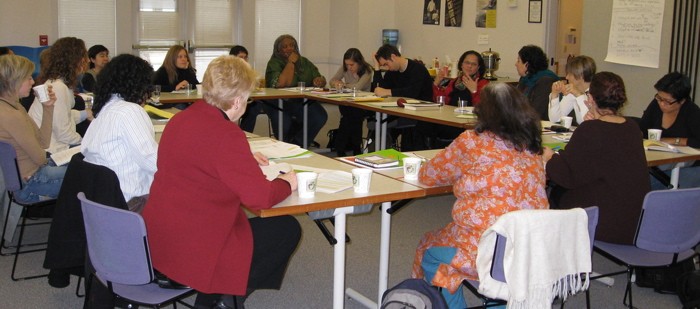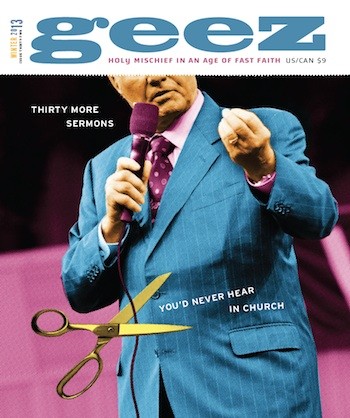Unsanitary liberation [First Place]

Credit: CWGL, http://www.flickr.com/photos/11230055@N02/2760925058
In 1992, the all-girl rock band L7 experienced technical difficulties during their set at the Reading Festival in England.
The disgruntled crowd began to clamour and throw mud onstage. In an act that has been hailed as one of the most memorable moments in rock history – the ultimate “Fuck you!” to the male establishment – lead singer Donita Sparks removed her tampon on stage and threw it into the crowd, yelling “Eat my used tampon, fuckers!” In subsequent interviews, Sparks remained defiantly unapologetic for this display of “menstrual weaponry.” Perhaps even more shocking, urban legend alleges someone in the audience actually returned the favour, tossing the tampon back on stage.
The person in the Bible with whom I most closely identify is the woman in Luke 8 who had been hemorrhaging for 12 years. The text does not record her name, and it is unlikely you will hear a sermon preached on this text or hear her story shared in front of a congregation. If by remote chance you ever do, it will not be the full story, but only a vague, sanitized version of what is actually a profound and telling encounter of a woman with a man named Jesus Christ.
In our modern culture, where it seems relatively few topics remain off-limits for discussion and debate, the menstrual taboo endures. Not only have surveys revealed the majority of adults and youth believe it is socially unacceptable to discuss menstruation, studies are finding that over half of women polled would prefer to periodically skip their monthly periods, if not stop their cycles altogether.
Many traditional (read: patriarchal) religions consider menstruation ritually unclean, including Christianity, where “versions of this taboo may have fueled the prohibition against women as priests in the Catholic Church” (see womenpriests.org).
On any given Sunday, 10 to 25 percent of women in the average church congregation are sitting on maxi pads. Pads that are absorbing not the clinical, clean blue dye of sanitary product commercials, but rather the dark red flow of blood and mucosal tissue shed from the uterus. However, the reality and rawness of the feminine experience is mostly ignored. “After a while it becomes psychologically disorienting for women to look out at a world where their reality doesn’t exist,” writes Karen Houppert in The Curse: Confronting the Last Unmentionable Taboo: Menstruation (Farrar, Straus and Giroux, 1999).
Our stories in their fullness are neither voiced nor understood. Culture and institutions appraise us as inferior because we are leaky. Never mind that in our leakiness, we have birthed every man (save one) that ever lived.
My own unusual bleeding started with childbirth – a piece of my son’s placenta was left, undetected, in the birth canal. Not enough to cause serious infection and complication, but just enough to provoke consistent, worrisome bleeding long after my midwife said I should have healed. Men don’t usually appreciate these details of my birth story.
And here we have a woman bleeding, hemorrhaging, for 12 years – not from an arm or a toe or an ear – 12 years of constant, life-draining uterine discharge from her vagina, leaving her debilitated, severely anemic and utterly depleted. She is weak and wasted, shunned by society, even family. She is so desperate, so vulnerable that she has been abused by so-called doctors and quacks, promising a cure, taking her money, delivering nothing, making things worse.
She’s desperate enough that when she hears rumours of a new rabbi – a supposed miracle worker, touched by God – passing through her village, she drags herself up and out the door, a trail of blood streaming behind, and dares to venture into the crowded marketplace. The people she jostles against are repulsed at her odour. The scent of a used tampon. But she has nothing else to lose, as the blood keeps draining. She approaches from behind. “Just the fringe,” she thinks, “and if he has any power at all . . .”
There is an immediate exchange. An instantaneous knowing in her body and between them – a power seeps from him into her and the bleeding stops. Overwhelming relief. But then the man stops as well. Turns and scans the faces of the throng pressed around him. “Who touched me?” he asks. A crazy question, undoubtedly striking fear into the heart of a woman who has lived 12 years in isolated embarrassment.
But we see that Jesus doesn’t abide by taboos. He is never squeamish or disgusted. Taking the woman’s hand, lifting her in soiled clothes, looking into her eyes and embracing the fullness of her story, he commends her for her faith – which is, in essence, the courage to believe his story.
Kelly Milne is a wife, mother, knitter, wilderness traveller, poet, wayfarer and thesaurus reader who attempts to balance these and other figurative spinning plates in Winnipeg, Manitoba. She blogs at milnesojourns.blogspot.ca.



Sorry, comments are closed.